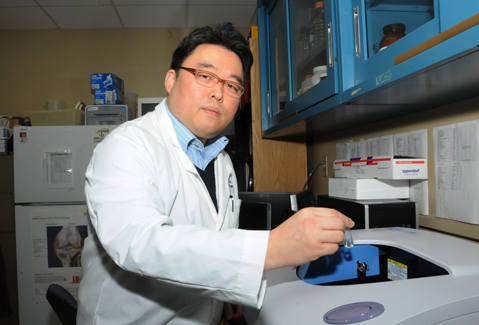
Osteoarthritis (OA) is an increasingly large burden on the American health care system. This debilitating condition affects 60 percent of Americans over the age of 60 — the fastest-growing demographic in the nation. Hongsik Cho, PhD, MBA, assistant professor in the Department of Orthopaedic Surgery at the University of Tennessee Health Science Center (UTHSC), has received a $130,808 grant award from the William and Ella Owens Medical Research Foundation. The award will support a project titled, “Theranostic Nanosomes for Osteoarthritis.”
Although there have been substantial advancements in the treatment of inflammatory arthritis, treatments for OA have lagged and are currently primarily palliative until joints become totally dysfunctional and prosthetic replacement is needed. Early detection and treatment of this condition could delay the onset of disease and spare pain and cost.
The purpose of Dr. Cho’s research is to develop a drug delivery system using the very small packets, called nanosomes, enclosing drug and a fluorescent dye to repair damaged cartilage. The earliest injury of joint cartilage damage starts from the destruction of the cartilage extracellular matrix (ECM) and exposed type II collagen, one of the major components of knee cartilage. Dr. Cho’s nanosome technology targets damaged cartilage only, using a specific antibody that binds to exposed type II collagen.
“We believe that binding of nanosomes containing therapeutic agents in a small animal model will target the release of this agent locally,” said Dr. Cho. “This will deliver high concentrations of the therapeutic agent locally where it is needed and prevent its general distribution. If successful, this targeted nanosome technology should aid in reducing general undesirable side effects.”
Founded in Texas in 1998, the William and Ella Owens Medical Research Foundation gives primarily to support original research on the cause, cure, treatment, or prevention of human diseases and disorders, including basic research, applied research, and clinical trials.
